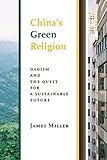China's green religion : Daoism and the quest for a sustainable future / James Miller.
Material type: TextPublication details: New York : Columbia University Press, (c)2017.Description: 1 online resource (xxiii, 200 pages) : illustrations, mapContent type:
TextPublication details: New York : Columbia University Press, (c)2017.Description: 1 online resource (xxiii, 200 pages) : illustrations, mapContent type: - text
- computer
- online resource
- 9780231544535
- BL1923 .C456 2017
- COPYRIGHT NOT covered - Click this link to request copyright permission: https://lib.ciu.edu/copyright-request-form
| Item type | Current library | Collection | Call number | URL | Status | Date due | Barcode | |
|---|---|---|---|---|---|---|---|---|
 Online Book (LOGIN USING YOUR MY CIU LOGIN AND PASSWORD)
Online Book (LOGIN USING YOUR MY CIU LOGIN AND PASSWORD)
|
G. Allen Fleece Library ONLINE | Non-fiction | BL1923 (Browse shelf(Opens below)) | Link to resource | Available | ocn982249101 |
Includes bibliographies and index.
Religion, modernity, and ecology -- The subjectivity of nature -- Liquid ecology -- The porosity of the body -- The locative imagination -- The political ecology of the Daoist body -- From modernity to sustainability -- From sustainability to flourishing.
"How can Daoism, China's indigenous religion, give us the aesthetic, ethical, political, and spiritual tools to address the root causes of our ecological crisis and construct a sustainable future? In China's Green Religion, James Miller shows how Daoism orients individuals toward a holistic understanding of religion and nature. Explicitly connecting human flourishing to the thriving of nature, Daoism fosters a "green" subjectivity and agency that transforms what it means to live a flourishing life on earth. Through a groundbreaking reconstruction of Daoist philosophy and religion, Miller argues for four key, green insights: a vision of nature as a subjective power that informs human life; an anthropological idea of the porous body based on a sense of qi flowing through landscapes and human beings; a tradition of knowing founded on the experience of transformative power in specific landscapes and topographies; and an aesthetic and moral sensibility based on an affective sensitivity to how the world pervades the body and the body pervades the world. Environmentalists struggle to raise consciousness for their cause, Miller argues, because their activism relies on a quasi-Christian concept of "saving the earth." Instead, environmentalists should integrate nature and culture more seamlessly, cultivating through a contemporary intellectual vocabulary a compelling vision of how the earth materially and spiritually supports human flourishing."--Provided by publisher.
COPYRIGHT NOT covered - Click this link to request copyright permission:
There are no comments on this title.
